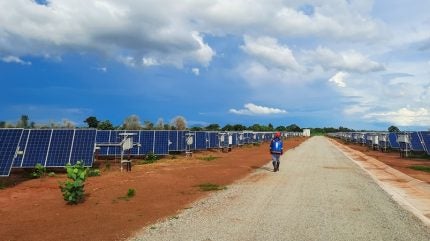
Uganda has become the latest country to join Africa’s solar revolution as Dubai-based renewables developer AMEA Power begins construction of the country’s 24MWp (megawatt peak) solar project.
The $19m Ituka solar photovoltaic (PV) project spans 52 hectares and is located in Ombachi Village, 450km from Kampala.
Once commissioned, the project will be the first and largest utility-scale grid-connected solar PV project in the West Nile region of Uganda.
It is also AMEA’s first operational asset in the country.
Power from the site will be distributed through the newly constructed Lira-Gulu-Nebbi-Arua 132kV transmission line operated by the Uganda Electricity Transmission Company.
Like most African countries, Uganda suffers from electricity blackouts, among other issues with its energy infrastructure.

US Tariffs are shifting - will you react or anticipate?
Don’t let policy changes catch you off guard. Stay proactive with real-time data and expert analysis.
By GlobalDataThe Ituka solar project is a significant step in resolving such challenges in the West Nile region, contributing to much-needed energy infrastructure development in the continent.
In 2022, the International Energy Agency reported that despite having 60% of the world’s solar resources, Africa only accounted for 1% of global installed solar PV capacity.
Power Technology’s parent company GlobalData reported that the Middle East and Africa combined registered the lowest percentage share of global cumulative installed solar PV capacity (2.41% in 2023) and generation (2.83% in 2023).
Despite registering these figures, 2023 saw a record number of solar modules being installed across Africa.
With the price of solar modules declining by 99% in the past 40 years, solar power was deemed the most appropriate solution to the continent’s struggles with electricity accessibility.
Robin Mills, a non-resident fellow at the Center on Global Energy Policy, told the Telegraph: “In Africa, the electricity supply is very poor. So, if solar can fix that, that is enormously helpful. It could be the basis for industrialisation and manufacturing because that is what Africa really needs.”
The Emerging Africa Infrastructure fund has been incredibly influential in supporting solar development across Africa. It is the sole lender for the Ituka project as well as the $20m Cuamba solar project in Mozambique and the $35m Kesses solar project in Kenya.
The implications of the solar revolution in Africa are notable. Projects like the Ituka solar power station will connect remote regions to the grid for the very first time.
Various solar technologies are also being deployed across the continent to support agriculture, as farmers will be able to carry out their tasks without power outages and increase the country’s food security.
However, the solar revolution must be paired with other energy developments. It will be difficult to integrate renewable technologies into the existing infrastructure, given the lack of reliable, extensive electricity grids across the continent. An established reliance on conventional fossil fuel sources could also deter investment away from renewable development.
Nevertheless, with the development of solar projects in Cameroon, Kenya, Mozambique and Uganda, among others, and African governments’ pledges to move from fossil fuel-based electricity to renewables, Africa is on the right path to unlocking its full potential for clean energy.



